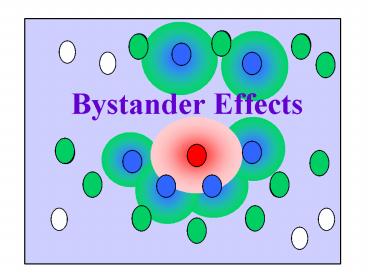Bystander Effects - PowerPoint PPT Presentation
1 / 14
Title:
Bystander Effects
Description:
The signals sent by the damaged cell may disrupt the normal function ... Induction of p53 in Rat Tracheal Epithelium by Radon. Ford et al 1997. Trachea. Trachea ... – PowerPoint PPT presentation
Number of Views:308
Avg rating:3.0/5.0
Title: Bystander Effects
1
Bystander Effects
2
Bystander Effects
When a cell is damaged by radiation, it can send
signals to bystander cells, which are the cells
near the hit cell.
The signals sent by the bystander cells may help
repair the damaged cell, or it may trigger the
cell to commit cell suicide.
The signals sent by the damaged cell may disrupt
the normal function of its neighboring cells, or
it may stimulate them to respond with additional
signals back to the damaged cell or to other
nearby cells.
3
How does radiation interact with cells?
- Past Theory
- Hit theory
- Radiation causes free radicals to damage only the
cell that is hit by direct ionization
- Present Theories
- Bystander effects
- Radiation causes free radicals to trigger
cell-cell communication and cell- matrix
communication to cells other than those which are
hit by the direct ionization.
4
How do cells communicate to each other?
- Direct
- Cell-Cell
- Communication
- Direct cell contact
- Gap junctions
- Indirect
- Chemical
- Factors
- Death Inducing Factor
- Clastogenic Factors
5
Examples of bystander effects in cells, tissues,
and organs
- Change in gene expression
- Mutations
- Apoptosis
- Chromosome aberrations
- Cell transformation
- Cancer
- Changes in sister chromotid exchanges
6
Mutation Frequency
7
Micronuclei
Geard
Cells were stained with two different dyes. Only
the nuclei of the cells stained with pink dye
were hit by alpha particles from a microbeam. The
figures show the presence of broken chromosomes
in the form of micronuclei (the smaller fragments
of pink and blue). These micronuclei are present
not only in the pink hit cells, but also in the
blue non-exposed cells. Such studies provide
direct evidence for bystander effects.
8
Cell Transformation
Sawant et al.2000
9
No bystander between organs exposed at low
dose-rates
- The site of deposition of the radioactive
material is the site of cancer induction - 90SR - bone cancer
- 144Ce liver/bone cancer
- 239 PuO2 (inhaled)- lung cancer
10
Does the bystander effect occur in animals as
well as cell culture?
- The bystander effect occurs in animal systems
- The bystander effect is limited to specific
organs or tissues - The bystander effect
- No bystander effects seen between organs at low
dose rates
11
Induction of p53 in Rat Tracheal Epithelium by
Radon
p53 Up-regulated in All Cells
Few Cells Hit
Ford et al 1997
12
The influence of communication on
radiation-induced micronuclei in lung
Lung cells shielded from direct radiation showed
a major increase in the production of micronuclei
(one indicator of chromosome damage) when other
cells in the lung tissue were irradiated,
indicating some type of communication between
cells.
Exposed Cells
Khan et al 1998
13
Conclusions
- Radiation exposure to cells can induce bystander
effects, or changes in cells not directly hit
by any radiation. - Bystanders result from communication due to
direct cell contact or release of material - At low dose rates, bystander effects for cancer
induction are present in vivo and limited to the
tissue exposed. - Initial radiation-induced changes to bystander
cells are very frequent events, suggesting total
tissue involvement. - Bystander effects indicate that
radiation-induced cancer is not a single cell
event, but a tissue and organ response. - Bystander responses have resulted in a major
paradigm shift related to the action of
radiation. - Bystander effects may either increase or decrease
radiation cancer risk.
14
For More Information on Bystander Effects
http//lowdose.tricity.wsu.edu/pub_topic/about_bys
tander.htm































